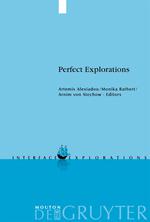Citation:

Abstract:
This paper explores the relationship of the perfect with time, in its grammatical expression both as tense and as aspect. While not denying that the perfect has other, non-temporal and non-aspectual uses, while in fact admitting that they are more wide-spread than its time-related uses, it argues that a relationship with time does exist; of the various time-related meanings associated with the perfect it is anteriority that turns out to be more “basic”, in the sense that all the other meanings of the perfect can be derived from it. The article has a strong historical bias: the basic meaning is assumed to have a historical precedence as well as a logical one.

